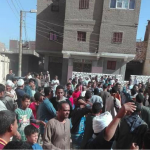By Declan Walsh – The New York Times –
Days before Egypt’s presidential election, President Abdel Fattah el-Sisi’s beaming visage adorns billboards across Egypt. His rivals are in jail, the news media is in his pocket and his sole challenger — a politician so obscure many Egyptians would struggle to name him — hasn’t bothered to campaign.
With the Irish bookmaker Paddy Power putting Mr. Sisi’s odds of losing at 1 in 500, most Egypt watchers are already looking past the vote that starts Monday to his next challenge: whether he can change the Constitution to extend his rule beyond the current eight-year limit.
The mystery, then, is why Mr. Sisi is acting like a man with something to lose.
As the election loomed, the Egyptian leader sometimes acted in ways that looked oddly jittery. He fired his army chief in October and a powerful spy chief in January. In speeches, he struck a choleric, sometimes threatening tone, railing against unspecified enemies. In a fierce media crackdown in the final month of campaigning, the government expelled a British reporter without explanation and even imprisoned a pro-Sisi TV host deemed to have stepped out line.
“It’s very confusing,” said Mohamed Anwar el-Sadat, a presidential contender who quit the race in January out of concern for the safety of his campaign workers. “Sisi has everything in hand. So why the fear?”
The reason, experts and diplomats in Cairo say, lies within the precincts of true power in Egypt — the military and security agencies that form the bedrock of Mr. Sisi’s authority. While the vote is expected to be a stage-managed confirmation, along the lines of those in China and Russia last weekend, it has exposed a rumble of discontent inside the security establishment that appeared to rattle Mr. Sisi.
Tensions spiked in the early stages of the election when two former generals stepped forward to challenge him. He quickly dispatched their bids — one man is in jail while the second, after a month in detention, disavowed his ambitions.
Few analysts gave either candidate much chance of beating Mr. Sisi, who retains broad support for his tough policies against Islamist militancy. But his unsparing reaction to their bids stoked speculation that they enjoyed support from a corner of the security establishment, a smidgen of dissent that Mr. Sisi found intolerable.
The security apparatus, which removed Mr. Sisi’s predecessor in 2013, poses the only real challenge to his power, said Robert Springborg, an Egypt scholar at King’s College. “The election puts that into relief,” he said. “It provides the shadows on the wall of the struggle that’s going on underneath.”
Pharaoh or Mamluk?
Egypt’s modern leaders are often likened to pharaohs — all-powerful leaders of a disciplined state. Mr. Sisi has encouraged that image, whether standing imperiously at the prow of a boat plowing through the Suez Canal, or posing against the backdrop of the pyramids.
But a more apt historical analogy, some say, lies with the Mamluks, a fractious military caste that ruled Egypt in the Middle Ages. For almost three centuries, Mamluk sultans ruled from Cairo’s citadel, but their supremacy rested on a cabal of restless subordinates who jockeyed for supremacy.
Under Mr. Sisi, a tight circle of generals and security chiefs wield vast economic and political power, overseeing secretive business and media empires while cracking down on any hint of opposition. Deciphering the inner workings of this circle is notoriously difficult, and the subject of a sort of Kremlinology among Western officials. But this year’s election seemed to crack open the lid on hidden strains.
That the two retired generals would run for office was no surprise. Ahmed Shafik, a former air force commander who served briefly as prime minister in 2011, ran for president in 2012. Sami Anan, who led Egypt’s army from 2005 to 2012, backed out of the 2014 presidential election after he was attacked in pro-state news media.
But this time they offered rare public criticism of Mr. Sisi and proposed to loosen his harsh rule.
Mr. Shafik, in his video message to launch his campaign, said: “A true democracy and basic human rights are not a given.” Mr. Anan tendered an olive branch to the young revolutionaries who helped oust President Hosni Mubarak in 2011, and who have been hounded by Mr. Sisi.
Mr. Anan was charged with breaching military rules and thrown in jail, where aides say he has been interrogated by military officers in balaclavas. Mr. Shafik was detained at a luxury hotel for a month before he publicly withdrew his candidacy.
A third military-linked candidate, an American-educated officer named Col. Ahmed Konsowa, was court-martialed in December and sentenced to six years imprisonment.
“Their attempted candidacies said to the Egyptian public that Sisi is doing a bad job and Egypt needs new leadership,” said Amy Hawthorne, an Egypt expert at the Project on Middle East Democracy. “That’s very provocative.”
Mr. Sisi rejected the notion that he pushed the other candidates out of the race.
“It is not my fault,” he said in a television interview on Tuesday. “I swear to God I wished there would have been more candidates for people to choose who they want. But they were not ready yet. There is no shame in this.”
With his rivals derailed, Mr. Sisi sought to shore up his own military credentials. He announced a sweeping military drive against Islamic State militants in Sinai and last month donned his old army uniform to open a new military command center.
In improvised remarks in January, he warned that Egypt’s security would be compromised “over the dead body of the military” — a statement that appeared to be aimed as much at internal critics as at the militants.
And he increased pressure on the news media. A journalist who interviewed Mr. Anan’s running mate was jailed. Last month, the government expelled Bel Trew, a reporter with The Times of London, despite a private protest from the British foreign secretary, Boris Johnson. The news organization says it has not received an explanation.
Sisi Forever?
To some analysts, Mr. Sisi is merely consolidating his power as he heads into a second four-year term. Despite the repression, many Egyptians still support him as an antidote to the turmoil they suffered after the Arab Spring.
The economy is improving as a result of tough economic reforms, many prescribed by the International Monetary Fund, even if they have inflicted painful inflation on tens of millions of poor Egyptians.
Mr. Sisi also enjoys the support of powerful foreign allies like President Donald J. Trump and the crown prince of Saudi Arabia, Mohammed bin Salman, who paid Mr. Sisi a three-day visit this month. He has drawn closer to Egypt’s old enemy, Israel, through discreet cooperation on counterterrorist operations in Sinai.
But Mr. Sisi has also made many contentious decisions. The military’s prominent role in running the economy is unpopular with businessmen and some military officers, a senior western diplomat in Cairo said.
The decision to hand two Red Sea islands, Tiran and Sanafir, to Saudi Arabia in 2016 was opposed by several senior defense officials, Ms. Hawthorne said, citing Egyptian media reports.
“I think it’s a vulnerability for Sisi,” she said. “He can try to move past it but people don’t forget.”
Although Mr. Sisi has faced talk of dissent before — in 2015 a military court reportedly convicted 26 officers on charges of plotting to overthrow him — experts say he is believed to enjoy staunch support among the military high command.
But they also note that he is tightening his inner circle, relying more heavily on his family. One son, Mahmoud, is a senior figure in the General Intelligence Service and has been an interlocutor in meetings with American officials in Washington. Another son works in an influential anti-corruption body.
Whatever Mr. Sisi’s popularity may be, this election will not be a reliable indicator. Egypt’s weak, fractured opposition has already written it off. The Muslim Brotherhood, the Islamist group that briefly enjoyed power until the military takeover that brought Mr. Sisi to power in 2013, is outlawed.
Mr. Sisi’s only challenger, Moussa Moustapha Moussa, held just two public events, one of which was attended by more journalists than supporters. “I’m no puppet,” he insisted to The Guardian this week.
On Wednesday, Mr. Sisi called President Vladimir V. Putin of Russia to congratulate him on his election victory last weekend, having also congratulated China’s Xi Jinping on his unanimous election in the National People’s Congress.
Both leaders have found way to circumvent term limits, and there are signs that Mr. Sisi has similar ambitions.
Last August, a member of Parliament loyal to Mr. Sisi proposed a constitutional amendment to extend term limits. In November, Mr. Sisi insisted he would not seek any changes.
Mr. Sadat, the opposition politician and nephew of his namesake, Egypt’s former president, said a broad coalition of opposition groups had started to hunt for candidate to contest the 2022 election — when, if the proposed constitutional changes take place, they expect to face Mr. Sisi again.
“Sisi hates politics and that’s what we are seeing in this election,” he said. “What worries me is what will come next. Are we going to see a Chinese model? That is the issue.”
_________________
Photo: President Abdel Fattah Sisi, whose image adorns banners and billboards across Egypt, appears certain to win re-election. But he is acting like a man with something to lose, observers say.Credit Mohamed Hossam/EPA, via Shutterstock




